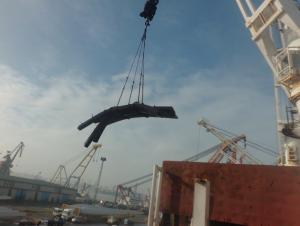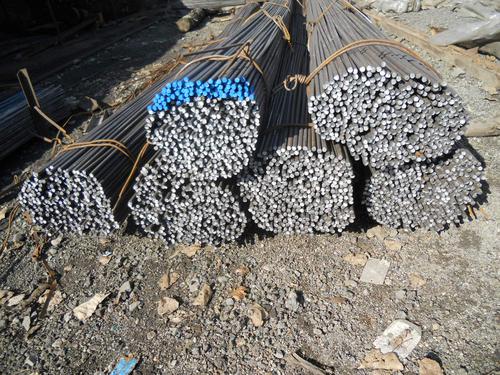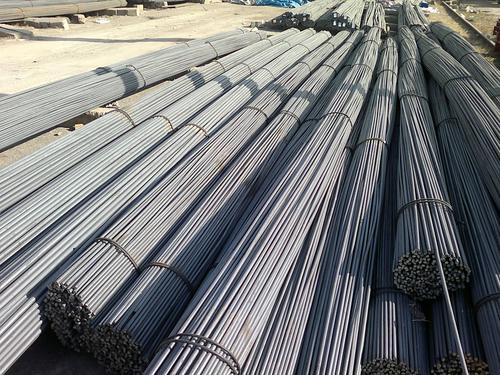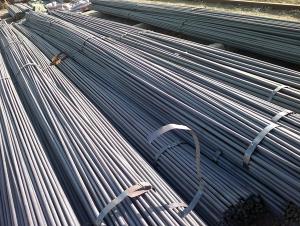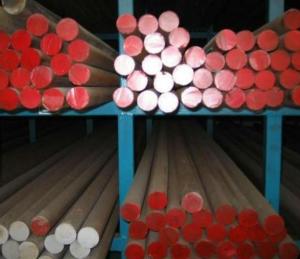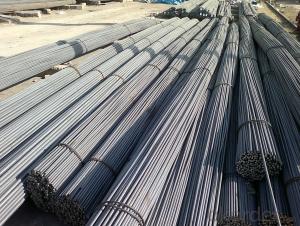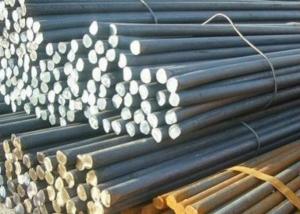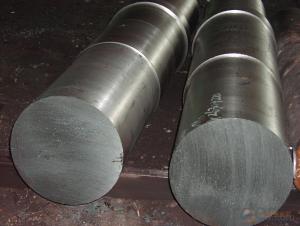mild steel round bar
- Loading Port:
- China Main Port
- Payment Terms:
- TT OR LC
- Min Order Qty:
- -
- Supply Capability:
- -
OKorder Service Pledge
OKorder Financial Service
You Might Also Like
Specifications of High Quality Round Bar
1. Grade: GB, JIS, ASTM, EN
2. Grade: Q235, SS400, A36, S235JR
3. Diameter and mass: As below
Diameter | Mass | Diameter | Mass | Diameter | Mass |
(mm) | (kg/m) | (mm) | (kg/m) | (mm) | (kg/m) |
6 | 0.22 | 22 | 2.98 | 53 | 17.30 |
7 | 0.30 | 24 | 3.55 | 56 | 19.30 |
8 | 0.40 | 25 | 3.85 | 60 | 22.20 |
9 | 0.50 | 26 | 4.17 | 63 | 24.50 |
10 | 0.62 | 28 | 4.83 | 65 | 26.00 |
11 | 0.75 | 30 | 5.55 | 70 | 30.20 |
12 | 0.89 | 32 | 6.31 | 75 | 34.70 |
13 | 1.04 | 34 | 7.13 | 80 | 39.50 |
14 | 1.21 | 36 | 7.99 | 85 | 44.50 |
15 | 1.39 | 38 | 8.90 | 90 | 49.90 |
16 | 1.58 | 40 | 9.86 | 95 | 55.60 |
17 | 1.78 | 42 | 10.90 | 100 | 61.70 |
18 | 2.00 | 45 | 12.50 | 120 | 88.85 |
19 | 2.23 | 48 | 14.20 | 140 | 120.93 |
20 | 2.47 | 50 | 15.40 | 150 | 138.82 |
4. Material: Mild Steel
5. Heat treatment of high quality steel:
Fire: Isothermal annealing temperature is 800 ~ 880 °C, with 10 ~ 20 °C, the furnace cooling to about 600 °C, hardness above HB269.
Preheat temperature: 730-730 °C
Quenching temperature: 1190-1210 °C
Tempering temperature: 540-595 °C
Cold drawn, hardness 285 HBS
Cold drawn after annealing condition, hardness 277 HBS
Quenching methods: oil quenching, air cooling or salt bath quenching
Usage and Applications of High Quality Round Bar
1) Suitable for making various strong cutting tool abrasion resistance, impact resistance.
2) Used to produce all kinds of high hard and super hard saw blade, drill, tap, broach, gear hob and various kinds of milling cutter.
3) Used for advanced punching die, screw die, and the toughness and complicated shape of the punch, etc.
4) Is used for cold forging die and drawing mode, etc.
5) Recommended watchcase factory, screw factory and other cold stamping products industry use.
Packaging & Delivery of High Quality Round Bar
Packaging Detail: All goods are packed in bundle with steel strips and shipped by break bulk vessel or container (depend on target market and different ports)
Delivery Detail: 45 days
Trade terms: FOB, CFR, CIF
MOQ: 25 tons per specification; we can negotiate the quantity if the specification is normal or we have stock of one specification.
Weight: The price invoicing on theoretical weight basis or actual weight basis depends on customer’s request.
Shipment: The shipment of bulk break or container is depends on customer’s request and the situation of the port of destination.
Documents given: Full set of original clean on board bill of lading; Original signed commercial invoice; Original packing list; Policy of insurance; Certificate of origin and what the target market needs.
Production Flow of High Quality Round Bar
The common processes are preheated forging quenching, dual refinement solution process, cooling quenching and isothermal quenching. We use heat treatment for dual refinement solution process. The main measures process is high temperature solution and refinement cycle. High temperature solution can improve the carbide morphology and particle size. The aim is to make the loop refinement ultrafine austenite grains.
- Q: What are the different types of steel round bar surface finishes for improved aesthetics?
- Enhancing the aesthetic appeal of steel round bars can be achieved through various types of surface finishes. The selection of these finishes is typically based on the desired appearance and function of the steel. The following are some commonly used surface finishes for steel round bars: 1. Polished: Achieved through a series of abrasive processes, this finish results in a smooth and reflective surface. It is often utilized in applications that prioritize visual appeal, such as architectural structures or decorative pieces. 2. Brushed: This finish is accomplished by brushing the steel surface with a wire brush or abrasive pad, creating a textured look. It offers a more contemporary and subdued appearance, commonly seen in modern architectural designs or furniture. 3. Satin: Similar to brushed, this finish possesses a finer texture, producing a smooth and matte appearance. It is favored for applications that require a sophisticated and elegant aesthetic, such as luxury fixtures or appliances. 4. Hammered: This finish involves creating small dents or dimples on the steel surface, resulting in a textured and rustic appearance. It is frequently utilized in applications that necessitate a unique and artistic look, such as handrails or decorative accents. 5. Etched: Achieved through chemical treatment of the steel surface, this finish allows for intricate and detailed patterns or designs. It is popular for applications that require personalized or branded elements, such as signage or logos. 6. Powder-coated: This finish entails applying a layer of powdered paint to the steel surface, which is then baked to create a durable and vibrant coating. It offers a wide range of color options and is commonly used in applications that require both decorative and long-lasting finishes, such as outdoor furniture or architectural elements. Ultimately, the choice of steel round bar surface finish depends on the desired aesthetic outcome and the specific requirements of the application. Different finishes can enhance the visual appeal of the steel, making it suitable for a wide range of industries and design purposes.
- Q: What is the resistance to fatigue of a steel round bar?
- The ability of a steel round bar to resist fatigue refers to its capacity to endure repeated cycles of loading and unloading without failing or deforming. Fatigue resistance is a crucial mechanical property for materials utilized in diverse applications, including structural components, machinery, and automotive parts. Several factors influence the fatigue resistance of a steel round bar, including the specific grade of steel, its microstructure, surface condition, and the applied loading conditions. Steel is widely recognized for its exceptional fatigue resistance in comparison to other materials, which explains its extensive utilization across various industries. The high strength, ductility, and presence of various alloying elements in steel contribute to its resistance to fatigue. These characteristics enable steel to endure cyclic loading without significant deformation or weakening. Moreover, the microstructure of the steel, such as grain size and distribution, significantly impacts its fatigue resistance. Engineers typically conduct fatigue tests, such as rotating beam or axial loading tests, to assess the fatigue resistance of a steel round bar. These tests subject the steel bar to controlled cyclic loading and measure the number of cycles it can withstand before failure occurs. The results determine the fatigue strength or fatigue limit of the steel, representing the maximum stress level it can indefinitely endure without failing. It is important to acknowledge that the fatigue resistance of a steel round bar can vary due to factors like surface defects, stress concentration, and environmental conditions. Therefore, proper design considerations, such as surface treatments, stress reduction techniques, and appropriate loading specifications, are crucial to ensure the desired fatigue performance of the steel round bar in specific applications.
- Q: What is the difference between a forged and a peeled steel round bar?
- A forged steel round bar and a peeled steel round bar are both types of steel bars used in various industries for different applications. However, there are distinct differences between the two in terms of their manufacturing processes and physical characteristics. A forged steel round bar is made by heating a solid steel billet to a high temperature and then applying pressure to shape it into the desired form. This process involves the use of machinery, such as hammers or presses, to shape the steel and create the round bar. The forging process imparts strength and durability to the steel, making it suitable for applications that require high strength and resistance to wear and tear. On the other hand, a peeled steel round bar is produced through a different manufacturing process known as peeling or turning. In this process, a solid steel bar is rotated against a cutting tool, which removes the outer layer of the bar, resulting in a smooth and precise surface finish. Peeling removes any surface defects or imperfections present in the original bar, improving its dimensional accuracy and surface quality. In terms of physical characteristics, forged steel round bars typically have a rougher surface texture due to the nature of the forging process. This rough texture can provide enhanced grip or adhesion when used in certain applications. Additionally, forged bars often have a denser and more uniform internal grain structure, which contributes to their superior mechanical properties. Peeled steel round bars, on the other hand, possess a smooth and shiny surface finish as a result of the peeling process. This smooth surface makes peeled bars suitable for applications that require aesthetic appeal or require a low coefficient of friction. However, the peeling process may result in a slight reduction in the overall diameter of the bar. In summary, the main difference between a forged and a peeled steel round bar lies in their manufacturing processes and resulting physical characteristics. Forged bars are created through the application of pressure, resulting in a rougher surface texture and superior mechanical properties. Peeled bars, on the other hand, are produced by removing the outer layer of a steel bar, resulting in a smooth surface finish and improved dimensional accuracy. The choice between these two types of bars ultimately depends on the specific requirements of the application at hand.
- Q: What are the advantages of using mild steel round bars?
- There are several advantages of using mild steel round bars. Firstly, mild steel is a cost-effective material, making it an economical choice for various applications. Secondly, mild steel round bars have good weldability, making them easy to join and fabricate into different shapes and structures. Additionally, mild steel round bars offer excellent strength and durability, making them suitable for construction projects and other heavy-duty applications. Furthermore, mild steel has good resistance to corrosion, which enhances its longevity and reduces the need for maintenance. Lastly, mild steel is readily available and widely used, allowing for easy sourcing and compatibility with existing materials and equipment.
- Q: Can steel round bars be used in the production of flanges?
- Yes, steel round bars can be used in the production of flanges. Round bars made of steel are commonly used as raw materials in the manufacturing process of flanges. These round bars are often machined, forged, or rolled into the desired flange shape. Steel round bars offer several advantages in the production of flanges, including high strength, durability, and resistance to corrosion. They can be easily fabricated and machined to meet specific size and dimensional requirements. Steel round bars are widely utilized in various industries, such as oil and gas, petrochemical, power generation, and construction, for producing flanges that are used in piping systems to connect pipes or equipment.
- Q: What are the safety precautions when handling steel round bars?
- When handling steel round bars, it is important to follow certain safety precautions. These include wearing appropriate personal protective equipment such as safety gloves, goggles, and steel-toed boots to protect against potential injuries. Additionally, workers should be trained on the correct lifting techniques to avoid strains or back injuries. It is crucial to inspect the bars for any defects or damages before handling them, as flawed bars can pose safety risks. Proper storage and handling techniques should be followed to prevent accidents such as tripping or falling. Lastly, communication and coordination among workers are essential to ensure a safe working environment when handling steel round bars.
- Q: Can steel round bars be used in the defense industry?
- Indeed, in the defense industry, steel round bars find utility. Steel, being a remarkably resilient and sturdy substance, proves fitting for diverse applications within the defense sector. The production of vital defense equipment, such as gun barrels, armor plates, missile casings, and other essential components, can be achieved using steel round bars. The durability of steel guarantees that these components endure high-pressure circumstances and furnish the essential safeguard and assistance demanded in defense applications. Moreover, steel round bars can be customized through machining, welding, or heat treatment to fulfill the distinct necessities of various defense systems, rendering them a material choice ideally suited for the industry.
- Q: Are steel round bars suitable for high-pressure applications?
- Yes, steel round bars are suitable for high-pressure applications. Steel is known for its strength and durability, making it a suitable material for withstanding high pressures. Additionally, steel round bars can be heat treated to further enhance their strength and resistance to pressure.
- Q: How are steel round bars used in the manufacturing of material handling equipment?
- Steel round bars are commonly used in the manufacturing of material handling equipment to provide strength, durability, and stability. These bars are often used as structural components in the construction of frames, supports, and lifting mechanisms. They can also be machined or shaped into shafts, axles, or rollers, allowing for smooth and efficient movement of materials. Overall, steel round bars play a crucial role in enhancing the performance and reliability of material handling equipment.
- Q: Excuse me, the difference between round steel, screw steel, steel, plate material, steel wire, hope professional answer
- Disk and rebar with rib, have all the same, basically can not see, rebar size is more than Phi 9, a lot of hardness than wire reinforced strong general, so the steel strip is usually linear, bluntly, steel disc is not up, disc. The size can be intercepted, so can be screwed up disc.
Send your message to us
mild steel round bar
- Loading Port:
- China Main Port
- Payment Terms:
- TT OR LC
- Min Order Qty:
- -
- Supply Capability:
- -
OKorder Service Pledge
OKorder Financial Service
Similar products
Hot products
Hot Searches
Related keywords



